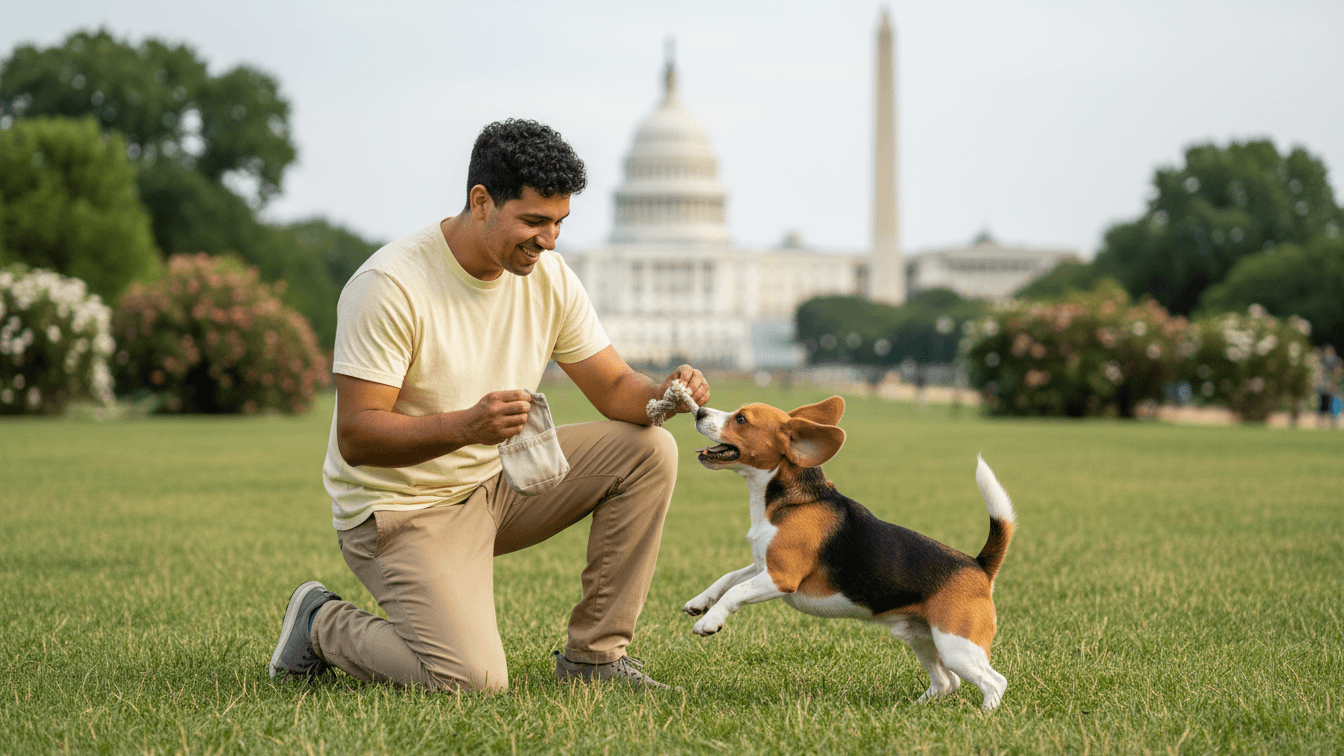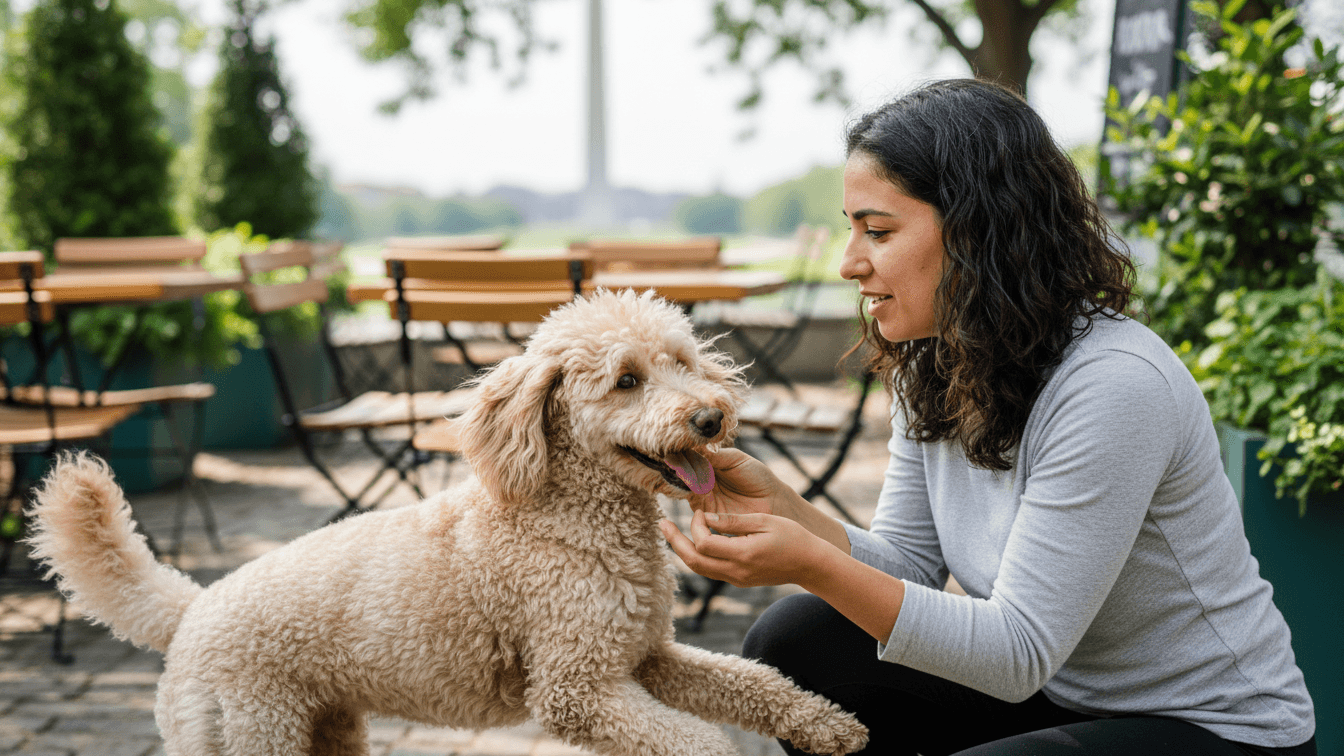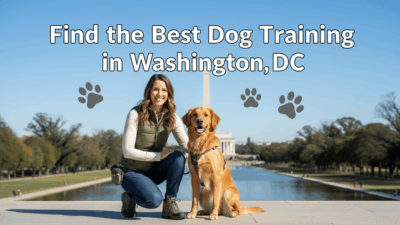Your Complete Guide to Choosing a Dog Trainer in Washington DC
Living with a dog in Washington DC means navigating crowded sidewalks in Dupont Circle, visiting the National Mall with tourists everywhere, and managing your dog near busy Metro stations in neighborhoods like Capitol Hill and Georgetown. Your dog needs solid training to handle all of this calmly, from loose-leash walks along Pennsylvania Avenue to staying polite when crowds gather for festivals and protests.
Since DC operates as its own jurisdiction, most local rules come directly from the District government rather than a county system. When you find a professional dog trainer who understands these urban realities, you’ll get better results both at home and out in your community.
How to Choose the Right Trainer
Start by looking for someone who uses positive reinforcement training and can set realistic goals for your DC lifestyle. This means your dog should learn to walk calmly past restaurant patios in Adams Morgan, stay focused near children at neighborhood parks, and handle encounters with other dogs on narrow sidewalks without pulling or lunging.
Credentials give you a quick way to compare trainers’ experience levels. Common dog trainer certifications include KPA-CTP, CPDT-KA, or IAABC-CDBC for behavior problems. If your dog has serious aggression issues, look for someone with CBCC-KA or a science-based program like CTC.
In-home dog training works great for puppy training, door manners when delivery drivers arrive constantly, and building skills in your actual apartment or rowhouse environment. Group classes make sense once your dog can focus around other dogs, especially before you try busy spots like Rock Creek Park on weekends.
Common Dog Training Methods Explained

Reward-based methods build the trust you want while creating lasting behavior changes. They also help you follow DC’s rules about keeping dogs under control in public spaces.
Basic obedience covers sit, down, stay, place, recall, and leash training so your dog can handle walks, outdoor dining areas, and park visits without pulling or jumping on pedestrians. These fundamentals become especially important when you’re squeezing past people on narrow Georgetown sidewalks.
Puppy classes focus on socialization, potty training, bite control, crate comfort, and early leash skills. Starting with short, positive training sessions prevents bad habits from forming in the first place and prepares your puppy for city sounds like sirens, construction noise, and street performers.
Behavior modification addresses fear, reactivity, resource guarding, or separation anxiety through careful desensitization and counterconditioning. For serious cases, ask if your trainer works with local veterinarians who understand behavior issues.
Private lessons and in-home sessions let you customize everything around your daily routines and your specific living situation, whether that’s a studio apartment or a house with a small yard. Day training can speed up results when you’re short on time and need faster progress.
Dog training classes help your dog practice good manners around other dogs and people. The best classes give dogs plenty of space, screen participants carefully, and teach calm behavior rather than just excitement.
Specialized training like therapy dog training or service dog training requires extra structure, public-access skills, and a very clear step-by-step program. Board and train programs can work for specific goals, but make sure the facility uses humane methods and includes thorough handoff sessions so you can maintain the progress.
Stay away from trainers who use fear, intimidation, or pain to get results. Humane methods are safer for everyone, easier to maintain long-term, and much better for keeping peace with your neighbors in close quarters.
Average Cost of Dog Training in Washington DC (Updated for 2025)
Prices around Washington DC tend to run higher than suburban areas because of the urban location, parking challenges, and higher business costs. Here’s what most local dog owners are paying in 2025.
| Service Type | Average Cost (Washington DC) |
|---|---|
| Puppy classes (4-6 weeks) | $200-$350 total |
| Group obedience classes (4-6 weeks) | $225-$400 total |
| Private lessons (60-90 min) | $150-$250 per session |
| In-home coaching packages (4-6 visits) | $600-$1,200 total |
| Day training (trainer works your dog + handoff) | $600-$1,200 per week |
| Behavior consult for reactivity/anxiety (initial) | $200-$325 |
| Board and train (2-4 weeks) | $2,800-$5,500 total |
You might pay less if you’re willing to travel to a trainer’s location rather than having them come to you. Expect higher rates for complex behavior work like aggression or severe separation anxiety.
Make sure you understand what’s included, how the trainer tracks progress, and whether they offer a free consultation or free evaluation before you commit to a training program.
Questions to Ask a Potential Dog Trainer
- What training methods do you use, and how do you keep sessions positive and low-stress for city dogs?
- What credentials do you have, like KPA-CTP or CPDT-KSA? Do you keep up with continuing education?
- How will you customize the training plan for my dog’s specific needs and our DC lifestyle?
- Do you offer in-home visits, dog obedience training classes, or day training, and which approach fits my goals best?
- How will we measure my dog’s progress and know when to add more distractions like busy streets or crowded parks?
- What are the total costs, including any travel or parking fees, and what’s your cancellation policy?
- Do you carry liability insurance, and can you show me proof?
- For behavior problems, will you work with my veterinarian if needed?
- What should I practice between our training sessions to help my dog keep improving?
- Can you help with urban-specific challenges like elevator manners, noise sensitivity, and small living spaces?
Local Washington DC Rules and Considerations
Washington DC enforces specific leash laws and animal control rules to keep parks and neighborhoods safe for everyone. Understanding these regulations helps you train your dog properly and avoid fines.
Leashes are required in all public spaces except inside designated off-leash dog parks. Keep a standard 6-foot leash with you for sidewalks, the National Mall, and any District park unless you’re inside a fenced dog area.
DC law requires current rabies vaccination for all dogs over four months old. You must also register your dog with the District and display a valid DC dog license tag on their collar at all times. Registration costs $15 per year for spayed or neutered dogs and $70 per year for intact dogs.
Excessive barking can be considered a nuisance under DC noise ordinances, so work with your trainer on alert barking and separation anxiety before neighbors start complaining. This becomes especially important in apartment buildings and attached rowhouses where sound travels easily.
Dog waste must be picked up immediately in all public and private spaces. Fines for not cleaning up after your dog can reach $500, so always carry bags and dispose of waste properly.
The District of Columbia doesn’t require special licenses for dog trainers, but trainers who board dogs as part of their dog training services must follow DC's animal care facility regulations. Check that any board and train facility maintains proper licensing through the Department of Health.
You can find registration information, licensing requirements, and animal control resources through DC’s Department of Health Animal Services.
Local Washington DC Resources for Dog Owners
These spots give you great places to practice polite manners, work on recalls, and provide safe enrichment for your dog. Always follow the posted rules and etiquette guidelines.
- S Street Dog Park (Dupont Circle) offers a fenced area split into sections for large and small dogs, perfect for practicing socialization and recall work during quieter morning hours.
- Shaw Dog Park (Shaw neighborhood) provides a smaller fenced space that works well for building confidence in dogs who get overwhelmed by larger groups.
- Walter Pierce Park Dog Area (Adams Morgan) features a popular off-leash space where you can practice distraction training once your dog has solid basics.
- Rock Creek Park trails welcome leashed dogs and offer miles of paths for building focus around joggers, cyclists, and wildlife.
- The National Mall allows leashed dogs, giving you excellent opportunities to practice calm behavior around massive crowds, tour groups, and unpredictable city activity.
- Theodore Roosevelt Island welcomes leashed dogs on its trails and provides a more natural setting while still being easily accessible from the city.

FAQs
How much does in-home dog training cost?
Most DC trainers charge $150-$250 per in-home visit, with package discounts available when you buy multiple sessions. Behavior problems typically start at the higher end of that range because they require more expertise.
Is in-home dog training worth it?
Absolutely, because you’re working on problems exactly where they happen. Your trainer can fix door manners when delivery drivers knock, jumping on guests in your small entryway, and leash reactivity on your actual neighborhood streets where you walk daily.
Can you pay someone to house train your dog?
Yes, many trainers offer puppy programs that include potty training, crate routines, and daily schedules adapted to apartment living. Day training can speed up the process while teaching you how to maintain the progress in your specific living situation.
What is the 3-3-3 rule for dog training?
This is a helpful timeline for new or adopted dogs: expect about 3 days for your dog to decompress, 3 weeks to learn your routines, and 3 months to feel completely settled. Good training programs work with this natural adjustment period rather than rushing results.
How long will it take to reach my training goals?
Most puppies and friendly adult dogs show solid progress within 4-8 weeks if you practice daily. Fear, reactivity, or aggression typically requires several months of careful behavior modification with gradual increases in difficulty as your dog builds confidence.
What should I bring to group classes?
Pack a flat collar or harness, a 6-foot leash, high-value treats, water, and current vaccination records if your trainer requests them. Leave retractable leashes at home for safety reasons.
What’s the leash law in Washington DC?
Dogs must be leashed and under control in all public areas, except inside designated off-leash dog parks. Keep that 6-foot leash handy for sidewalks, parks, and the National Mall.
Do I need a dog license in Washington DC?
Yes, all dogs over four months old must be registered with the District and wear a valid DC dog license tag. Registration costs $15 per year for spayed or neutered dogs and $70 per year for intact dogs. You can register online or in person through DC Animal Services.
What shots does my dog need in Washington DC?
Rabies vaccination is required for all dogs over four months old. Your veterinarian may also recommend distemper-parvo, bordetella, and other vaccines based on your dog’s lifestyle and exposure to other dogs.
Are dog trainers required to be licensed in Washington DC?
No special trainer licenses exist in DC. Trainers follow normal business regulations, but if they offer board and train services, their facility must be licensed as an animal care facility under DC Department of Health regulations.
Where can I practice off-leash recall?
Use fenced dog parks like S Street Dog Park, Shaw Dog Park, or Walter Pierce Park Dog Area to keep things safe and legal. Try visiting during quieter hours when you’re starting out so your dog can focus better.
Which dog parks allow training around Washington DC?
S Street Dog Park, Shaw Dog Park, and Walter Pierce Park Dog Area all allow off-leash play within their fenced areas. These spaces work well for practicing recalls, socialization, and calm greetings with other dogs during less crowded times.
What beaches or trails allow dogs for training?
Rock Creek Park and Theodore Roosevelt Island both welcome leashed dogs on their trails and provide excellent settings for distraction training. The C&O Canal Towpath allows leashed dogs for miles of walking practice. While DC doesn’t have beaches, you can find dog-friendly beach areas within driving distance in Maryland and Virginia.
How do I help my dog with city noise sensitivity?
Work with your trainer to gradually expose your dog to city sounds like sirens, construction, and Metro trains through careful desensitization. Start with recorded sounds at low volume indoors, then slowly work up to real-world exposure while pairing the sounds with treats and calm behavior.
What if my dog is reactive on crowded sidewalks?
Reactivity is common in DC because of narrow sidewalks and constant close encounters with other dogs and people. A certified dog trainer experienced with behavior modification can teach you management skills while working on the underlying emotional response through counterconditioning.
Can I train my dog to use the Metro?
Yes, though pets must be in carriers on Metro trains and buses. Some expert dog trainers can help you work toward getting your dog comfortable with elevators, escalators, crowds, and the sounds of public transit if you need your dog to travel with you regularly.
The right combination of thoughtful planning, humane methods, and consistent practice around DC’s unique urban environment will help your dog become a confident, well-behaved companion. Whether you’re navigating rush hour on 14th Street or enjoying a quiet moment at a neighborhood park, proper training makes city life easier for both of you.
